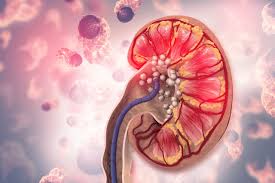Kidney stone form when certain substances in the urine become highly concentrated and crystallize, leading to the formation of solid particles within the kidneys or urinary tract.
Several factors can contribute to the development of kidney stones, including:
Dehydration: Insufficient fluid intake can lead to concentrated urine, increasing the likelihood of crystal formation. When there is not enough water to dilute the substances in the urine, such as calcium, oxalate, and uric acid, they are more likely to crystallize and form stones.
Dietary Factors: Certain foods and beverages can contribute to the formation of kidney stones. Foods high in oxalate, such as spinach, nuts, chocolate, and beets, can increase the risk of calcium oxalate stones. Similarly, a diet high in sodium (salt) can lead to higher levels of calcium in the urine, promoting stone formation.
Genetic Predisposition: Some individuals may have a genetic predisposition to kidney stone formation. Certain genetic conditions can affect the levels of substances in the urine, making it more likely for stones to develop.
Medical Conditions: Certain medical conditions and metabolic disorders can increase the risk of kidney stones. These include hyperparathyroidism, gout, cystinuria, and urinary tract infections. People with digestive diseases or surgeries that affect the absorption of nutrients may also be at higher risk.
Obesity: Excess body weight can increase the risk of kidney stones by affecting urinary function and promoting the excretion of calcium and other substances that can form stones.
Medications: Some medications can increase the risk of kidney stone formation by altering urine composition or increasing the excretion of certain substances. Examples include diuretics (water pills), calcium-based antacids, and certain antibiotics.
Urinary Tract Obstruction: Conditions that obstruct the flow of urine, such as kidney stones, enlarged prostate, or urinary tract abnormalities, can increase the risk of stone formation by allowing urine to stagnate and crystals to accumulate.
Lifestyle Factors: Certain lifestyle factors, such as sedentary behavior, excessive alcohol consumption, and high-protein diets, may also contribute to the development of kidney stones by affecting urinary function and increasing the concentration of stone-forming substances in the urine.
It's essential to note that the formation of kidney stones is often multifactorial, and individuals may have a combination of risk factors contributing to their development. Understanding these risk factors and making appropriate dietary and lifestyle modifications can help reduce the risk of kidney stones and promote overall kidney health. If you have a history of kidney stones or are concerned about your risk, consulting with a healthcare professional can provide personalized guidance and recommendations tailored to your needs.





Comments